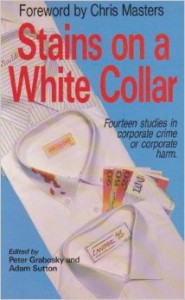A Case Study in Fraud

Corporate fraud, or to put it in another way, white collar crime, has been around for as long as people have been engaged in commerce, which pretty much dates back to the fall. The Bible actually outlines some of the tricks that these ancient shysters used to pull, such as manipulating the weights of the scale to make their products appear more expensive than what they really were (trade and commerce worked on the weight of precious metals; the sanctuary shekal, which appears in the New Testament, was a weighting of silver).
However, come the turn of the 21st Century, a whole cottage industry was arising with books railing against corporate fraud and the misuse of corporate power, and this appears to have brought us to the brink of economic collapse. The question is whether these securities (Collateral Debt Obligations et al) were the products of fraud, or were simply misused. Well, consider that these products were incredibly risky investments, but the issuers would bundle the high grade loans (which they represented) up with a incredibly risky loans, get a ratings agency to rate them AAA, and then flog them off to unsuspecting pension funds and you pretty much have something very similar to the ancient practice of using dodgy weights and scales to get a quick profit.
Okay, this particular book has nothing to do with the issuing of high risk securities and passing them off as AAA rated products, but when this book was written the perception was that white collar crime was something that only a few rogue executives committed, and pretty much the rest of the business community where good upstanding members of society. However, this is not really the case. Written in 1989, this was a year after the Savings & Loans scandal in the US sent the west into a recession and brought about the collapse of numerous banks (including South Australia's State Bank). While this once again has a lot to do with the over indebtedness of the borrowers (which is very similar to what is happening now) many of these economic disasters do not happen through ignorance. Since people do not get to the top of the corporate ladder if they are ignorant (well, that is debatable, but let us assume that our corporate CEOs are at least above average intelligence) then there must be some complicity within the boards.
This book has a look at 14 scams that were run in Australia, and while they are generally not as far reaching as the current crisis, it goes to show how difficult it can be to pick up on fraud. To prove fraud one must be able to prove that somebody either lied, or was wilfully deceitful. While those two categories are similar, they are not identical. A lie is when you tell somebody something that you know to be untrue, whereas to be willingly deceitful one need only leave out important facts (such as the high grade loans being bundled together with risky loans). Other times it can simply be that people get caught up in promises of wealth, and when that wealth fails to eventuate, suddenly the company that we invested our lifesavings in turns out to be a house of cards, and the whole edifice collapses (obviously one of my positions is that our entire economy is a house of cards, and at this present point in time is only being propped up by government intervention, and the governments are quickly running out of ways to keep this house of cards standing).
Take Enron for example: it was an energy trading company in that it bought energy from one source, sold it to another, and kept the profit it made for itself. As they grew, they took control of the producers and distributors, but it always was little more than a middle man. However a company must continue to grow, to continue to look for ways to squeeze more profit out of a dwindling supply of resources, so they decided to play the game of rolling blackouts. They cut down on the amount of energy that was available to California forcing the price to skyrocket. As the price went up, the government had no choice but to institute price caps. That was not supposed to happen in the US, but it did, and this black swan event hit Enron so hard that the house of cards that it was was revealed and the entire edifice collapsed.
What has this got to do with White Collar Crime? Well it is an example of how endemic it actually is. Unlike what this book says, it is not a few bad apples trying to rip off consumers and governments, but it is the nature of our capitalistic society. The chase for even bigger and greater profits will always have the corrupting influence on those at the top.


